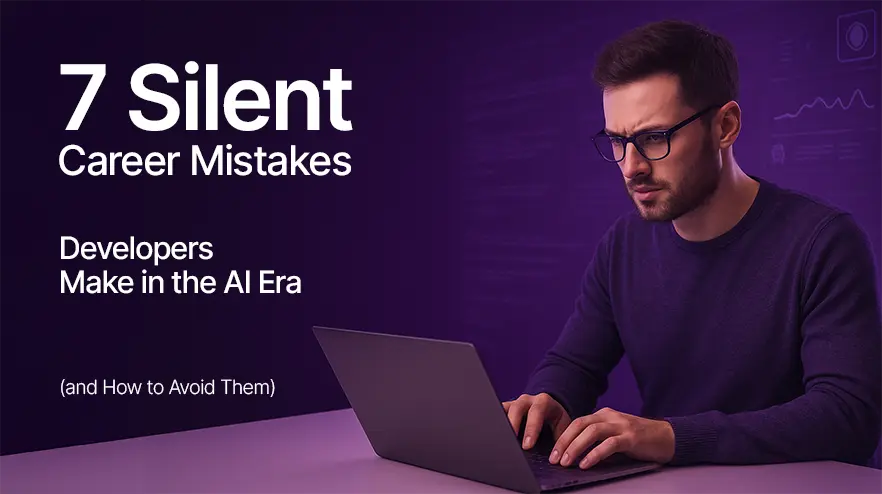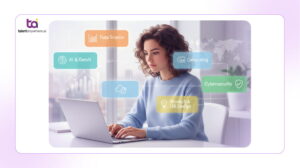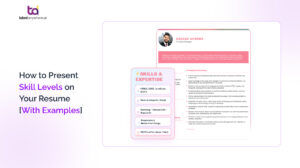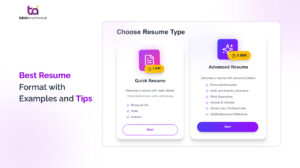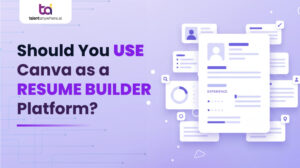Do you ever catch yourself wondering, “Will AI make my job irrelevant?” You’re not alone. In fact, a recent survey revealed that nearly 40% of developers share this exact fear. And it isn’t just paranoia.
AI is moving faster than anything we’ve ever witnessed in tech. Every few months, a new model drops that’s sharper, faster, and better at coding than the last. One moment you’re catching up with GitHub Copilot, and the next you’re hearing about models that can build entire applications end-to-end. It feels like a race, and the ground beneath us is shifting daily.
But here’s the thing: this isn’t the first time we’ve faced a revolution like this. When the internet arrived, plenty of people ignored it. A few early adopters leaned in and built billion-dollar companies. The same thing happened with social media. Many mocked it in the beginning, but those who embraced it built careers, brands, and even entire industries around it.
AI is simply the next wave of that story. And as a developer, this is your defining moment. The choices you make now will decide whether you thrive in the AI era—or quietly fade into irrelevance.
That’s why this blog isn’t just about “AI is changing everything.” You’ve already heard that. Instead, we’re going to break down the 7 silent mistakes developers are making right now—mistakes that can derail your career if you’re not careful.
Let’s dive in!
7 Career Mistakes you are Making as a Developer in the AI Age
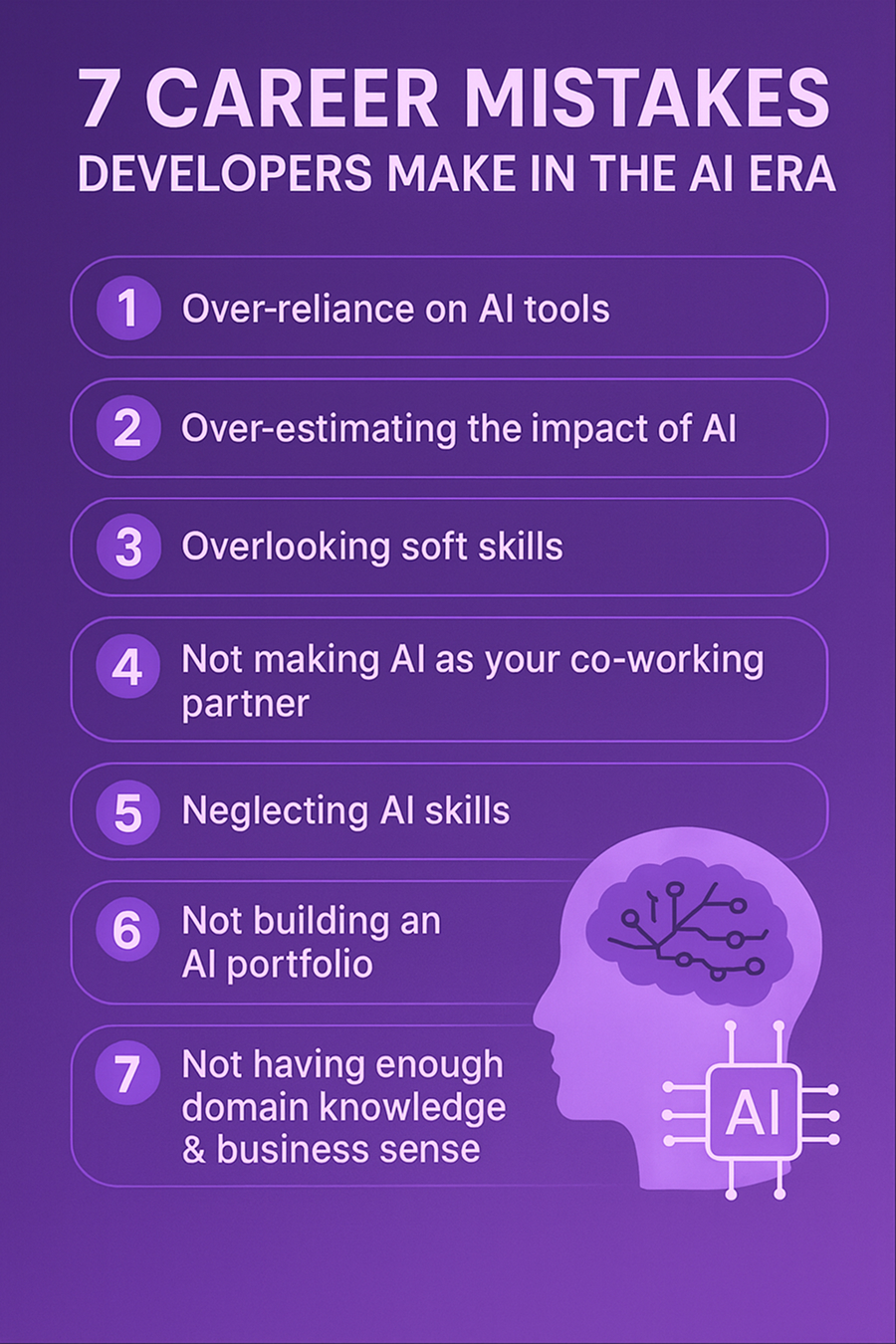
1. Treating AI as a Crutch, Not a Tool
AI makes your work faster, but relying on it blindly can damage your career. Many developers are slipping into this trap.
The most common mistake is treating AI like an autopilot. You ask it for code, content, or solutions and then copy-paste the result without a second look. That approach is dangerous. AI output often looks convincing, but it can contain errors, gaps, or outdated practices. If you skip reviewing and testing, you end up delivering weak results. Over time, this lowers trust from managers and teammates.
Treat AI output like a first draft. Review each line of code, run tests, and refine it. For instance, if AI generates a sorting function, make sure it handles edge cases and performance considerations instead of assuming it’s perfect.
Another mistake is overpromising. Developers often take on projects they have little or no experience in because they think AI will carry them. Sometimes it works, but in the long run, it exposes gaps in your knowledge. You become dependent instead of learning the skill yourself. This makes you less valuable to the team and limits your growth. If you lean on it too much, you stop building judgment, problem-solving, and critical review skills. These are the same skills that employers value most.
When using AI to explore new domains, pair it with learning. For example, if AI helps generate a machine learning script in Python, spend time understanding the logic behind it. This approach builds real skills rather than dependency.
2. Believing AI Will Replace Everything Overnight
Many developers panic and assume AI will wipe out their jobs soon. Overestimating AI’s impact also makes you chase trends without direction. You might spend time learning every new AI framework instead of strengthening your core programming skills. AI-driven tools like GitHub Copilot improve speed, but they still rely on your logic, review, and debugging. If you keep your fundamentals strong while staying aware of AI’s role, you future-proof yourself instead of reacting to fear.
It is important to remember that, right now, AI is strong at pattern recognition, automation, and assisting with repetitive tasks, but it still struggles with context, creativity, and problem-solving in messy real-world systems. In this context, companies still need developers who understand system architecture, scalability, debugging, and domain knowledge.
Instead of chasing every new AI tool, focus on mastering your core stack and then selectively learn AI frameworks that complement your work. For example, apply Hugging Face transformers to a project where NLP adds real value, rather than exploring all tools at once.
Instead of worrying and seeing AI as a threat, you need to see AI as a tool that enhances productivity.
3. Forgetting Human Expertise Still Wins
Developers often forget that AI is evolving faster than hard skills alone. Big players like OpenAI, Anthropic, and Google are pushing updates almost every quarter, with LLMs like Claude and Gemini now generating production-level code. Tools are emerging that build applications end-to-end, debug errors, and automate software pipelines. These tools are maturing at scale, which means coding speed or syntax knowledge is no longer enough. The value you bring lies in your problem-solving, decision-making, and ability to connect technology to real-world challenges.
Focus on designing use cases, spotting workflow gaps, and building services that add measurable value. For instance, instead of just coding a recommendation engine, analyze how users interact with the system and propose improvements AI alone wouldn’t suggest.
AI can generate outputs, but it cannot innovate on its own. Innovation depends on how you see problems and create solutions that matter. As a developer, you need to focus on designing use cases, spotting gaps in workflows, and building services that add measurable value. AI will keep producing better code, but your edge is in asking the right questions and framing the right problems. The opportunity lies not in competing with AI at writing lines of code, but in using it to accelerate your vision.
4. Ignoring AI as Your Daily Collaborator
Not being productive at your work is a sure way to slow down your career or even put it at risk. Not using AI as your co-working partner means you are losing the chance of being 55% more productive at work! Many developers are still stuck in the ostrich syndrome. They avoid AI tools, hoping things will go back to normal. That will not happen. AI is already part of coding, testing, and debugging. Ignoring it only keeps you behind. Developers who treat AI as competition lose the chance to use it as a productivity multiplier. AI is not replacing you, but it is replacing those who refuse to adapt.
Start integrating AI into your daily workflow in small ways. Use GitHub Copilot to speed up repetitive coding tasks, AI-based linters to catch errors faster, or automated testing tools to ensure code quality. Treat AI as a teammate that helps you focus on higher-level problem-solving.
5. Skipping the Hard Work of Building AI Skills
You might have heard complaints from developers over the internet or at your workplace that AI tools produce poor-quality code or outputs that don’t match standards. In many cases, the issue is not the tool but how you prompt it. Prompt engineering is becoming a critical skill, and learning how to talk to AI decides the quality of the results you get. Developers advancing with AI are not using better tools than you, they are simply learning to ask better questions, iterate smarter, and refine outputs until they are production-ready. If you ignore this, you’ll fall behind peers who are getting more done with the same tools.
Beyond prompts, you also need to build literacy around ML, data, and AI-driven development. Learn how to read and work with data, explore AI-powered editors like Cursor, experiment with GitHub Copilot, and keep trying new tools that speed up your workflow. Thousands of AI tools are already out there. If you’re not constantly scanning and testing what works for you, you’re limiting your growth. Think of AI as part of your toolkit. The more you adapt, the sharper you stay.
Dedicate time weekly to experiment with new AI tools. Build small projects, test prompts, analyze outputs, and refine your workflow. For example, create an AI-powered code analyzer that checks for security or performance issues—this teaches you both AI literacy and software best practices.
6. Showing Up Without an AI Portfolio
Degrees don’t guarantee you a job anymore. Most companies don’t care about where you studied (Unless you have a Harvard tag). They care about what you can build and how fast you learn. Hiring managers want to see real projects, not a list of courses. An AI portfolio proves you have hands-on skills and can apply concepts to solve real problems. Without one, you risk being overlooked by recruiters who want proof of execution.
Look at the AI influencers blowing up on LinkedIn or Instagram. Most aren’t from Ivy League schools. They gained credibility by showing projects, demos, and workflows that prove they know how to work with AI. That visibility gets them opportunities. Companies want to work with people like that.
Not building a portfolio is like walking into a job market unarmed. Start small. Build AI apps, publish code on GitHub, write about your experiments, or share demo videos. Not building an AI portfolio in today’s era as a developer means entering a warzone without weapons. Every project you add becomes a weapon in your arsenal and increases your chances of getting hired.
Start an AI portfolio today. Even a single project—a chatbot, a data visualization tool, or a simple ML model—can showcase your skills. Document your process, share code, and make it visible online. Consistency beats scale.
7. Not having enough domain knowledge & business sense
If you rely on AI to generate code without knowing the domain, you have no way to judge its accuracy. For example, if a content writer generates a Python script using AI, but without coding knowledge, how will they know if it works or breaks in production? The same happens with developers. If you lack domain knowledge, you fail to evaluate whether your solutions are correct, safe, or practical. You become dependent on outputs without knowing their impact. Domain knowledge gives you the ability to review, refine, and improve AI-driven work. Without it, you risk shipping poor solutions that waste time and money.
Business sense is equally critical. What separates you from the average developer is your ability to link technical work with business goals. Without business awareness, you end up building features no one uses. Strong domain knowledge and business sense turn you into a developer who creates real value, not just functioning code.
Pair technical learning with domain expertise. For example, if you’re working in fintech, understand payment flows and regulatory rules. If in healthcare, learn basic patient data workflows. Combine this with AI assistance to create solutions that truly work in context.
How to Avoid these Mistakes

- Ship don’t scroll: Stop binge-watching AI tutorials. Start with a simple AI feature. A chatbot, code analyzer, or business automation. Prototype, break, fix, and repeat. Momentum and insight arrive through action. A half-broken tool you coded teaches you more than ten hours of YouTube.
- Show receipts: Employers don’t want to hear you “know AI.” Publish projects on GitHub, post demos on LinkedIn, or write short case studies because that’s how you stand out in the sea of talkers. Remember that visibility creates credibility
- Treat AI like a skill, not a toy: Playing with ChatGPT for fun is fine. But if you’re not integrating AI into real workflows, you’re training yourself to stay replaceable.
- Learn the business, not just the code: Knowing Python is table stakes. Knowing how Python applies to healthcare, fintech, or logistics makes you valuable. Domain expertise is what AI can’t replace.
- Move from consumer to creator: Tutorials are comfortable. Building is not. Ship a rough MVP. Fix with feedback. Iterate publicly. That’s leadership. That’s learning. That’s the kind of dev every recruiter wants.
- Document your process: A working project matters, but explaining how you solved the problem shows real thinking. Blog posts, walkthroughs, and simple breakdowns make you memorable.
Conclusion
When the internet and social media happened, the biggest mistake wasn’t adoption, it was resisting and delaying it. For both seasoned and beginner developers, don’t repeat that mistake with AI. The cost this time is your career. AI is moving faster than any shift before.
The good news: if you stay open and adaptable, you’ll ride the AI wave instead of being swept by it. The developers who thrive now aren’t the ones with the longest resumes. They’re the ones who stay curious, publish proof of work, and show they understand both code and business. Your choice is clear. Use AI to accelerate your career, or watch it accelerate someone else’s. Don’t wait until your skills expire. Start today, ship projects, learn domains, share your work, and keep adapting.
Read summarized version with
talentanywhere.ai Blog
Explore insights on job readiness, global hiring trends, AI-powered recruitment, and career growth strategies. Our blog brings you practical tips, product highlights, expert advice, and success stories to--empowering job seekers, recruiters, and businesses to connect with the right talent, anywhere.


